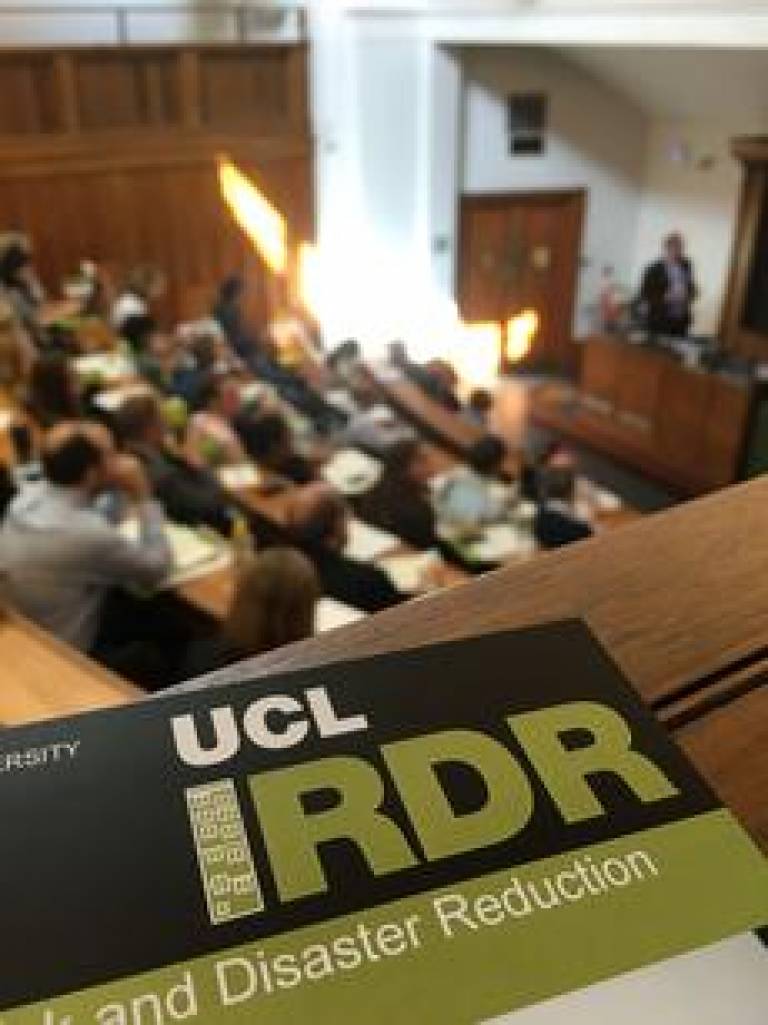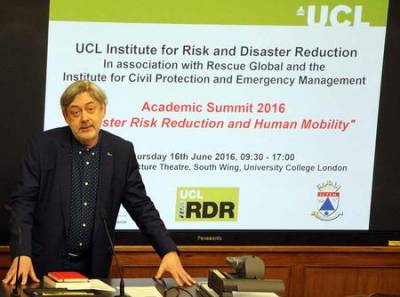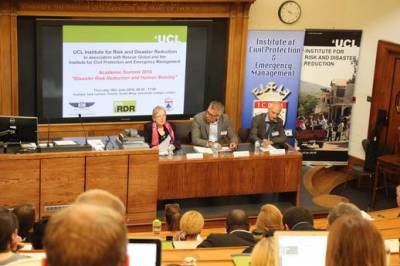June 16th 2016: Fourth Academic Summit "Disaster Risk Reduction and Human Mobility"
28 July 2016
On 16th June 2016 IRDR hosted the Fourth Academic Summit at UniversityCollege London.
 Like the previous three
events in the series, this conference was designed to bring together academics
and practitioners from the UK and beyond who are working in the field of
disaster risk reduction. This year's event, devoted to "DRR and Human
Mobility," was held in UCL's historic Gustave Tuck lecture theatre. There
were three sessions during the summit. The first set the scene by examining the
links between disasters and migration. The second integrated experience from
the field and from studies of these two phenomena. The third considered what
we, as experts on disaster, might be able to contribute to studies of the links
between migration and disasters.
Like the previous three
events in the series, this conference was designed to bring together academics
and practitioners from the UK and beyond who are working in the field of
disaster risk reduction. This year's event, devoted to "DRR and Human
Mobility," was held in UCL's historic Gustave Tuck lecture theatre. There
were three sessions during the summit. The first set the scene by examining the
links between disasters and migration. The second integrated experience from
the field and from studies of these two phenomena. The third considered what
we, as experts on disaster, might be able to contribute to studies of the links
between migration and disasters.
Human mobility is a term that embraces refugees, so-called 'economic migrants' and all others who by necessity, coercion or personal choice leave their homelands with the intention of settling elsewhere. At present in the world there are more than 60 million international refugees and 12 million internally displaced persons. What would happen if a crisis involving the need to accommodate large numbers of migrants coincided with a natural or technological disaster? What can migration studies learn from disaster studies, and vice versa? These are two of the many questions discussed during the Summit.

The first panel consisted of Maureen Fordham (Northumbria University), Alpaslan Özerdem (University of Coventry) and Robin Goodwin (University of Warwick). The importance and changing profile of gender in migration was discussed. So was the vulnerability of refugees. It was noted that the excessive emphasis on 'crisis' and 'emergency' reduces opportunities for the integration of migrants, a process that requires much effort to build and maintain trust. The context of human mobility needs to be taken into account, as there are many causes and motivations, as well as many different circumstances and kinds of need.
The second panel comprised Andrew Seal (UCL), Zoë Scott (Oxford Policy Management), Randolph Kent (King's College London), and David Rubens (Deltar Training Solutions). The changing profile of migration streams was discussed, and so was the difficulty of providing assistance to migrants when there are so many humanitarian emergencies. Assistance needs to be provided at the point of arrival more than at the point of departure. Henceforth, the profile of migration will be ever more intimately linked with the pattern or urbanisation. Slums will grow and cities will become so complex that new ways of managing them must urgently be sought.
The third and final panel was composed of Giovanni Bettini (University of Lancaster), Emily Wilkinson (Overseas Development Institute), Ilan Kelman (UCL IRDR) and Andrew Collins (Northumbria University). There was discussion of the political implications of migration and the need to rid it of alarmism. Climate change may become one of the biggest sources of migrants, but this could be turned to advantage if serious attempts made to resettle them and to treat migration as a form of sustainable development. As academics, we need to work hard and carefully to understand the underlying causes of migration and vulnerabilities of migrants, especially in the face of disaster. We need to seek new ways to engage with the issues.

Participants at the Academic Summit placed emphasis on awareness and careful analysis and on not taking common assumptions for granted. Whether conflict or climate change is involved, the links between migration and disaster are becoming slowly more evident. As students of disaster we are very familiar with dynamic change, and with the need to enquire into broad, interdisciplinary risk drivers. The Summit gave us the opportunity to think deeply about the issues, and we can be sure that in the near future they are not going to dwindle into insignificance.
Images courtesy of Kim Trabant and Ilan Kelman.
 Close
Close






